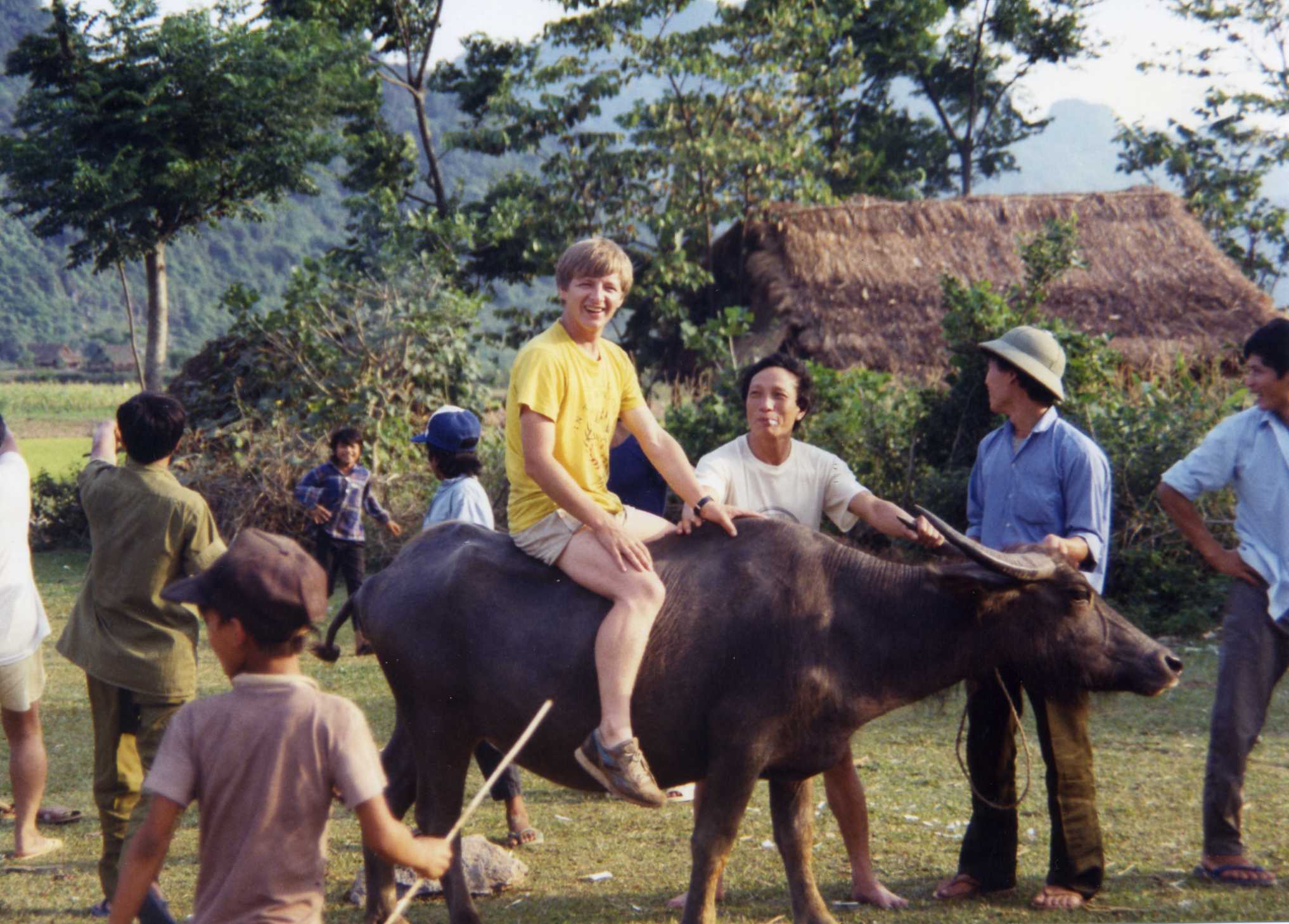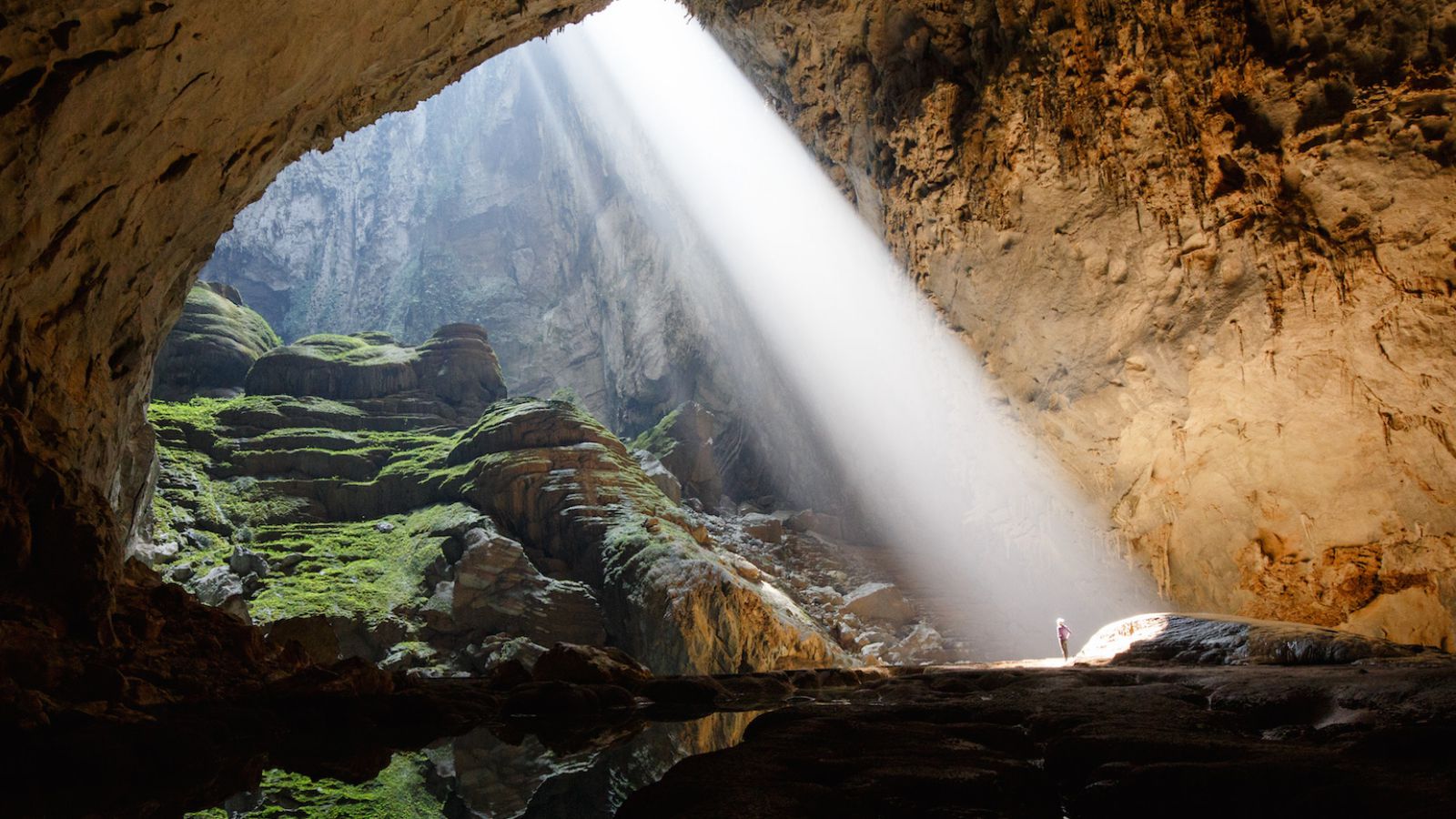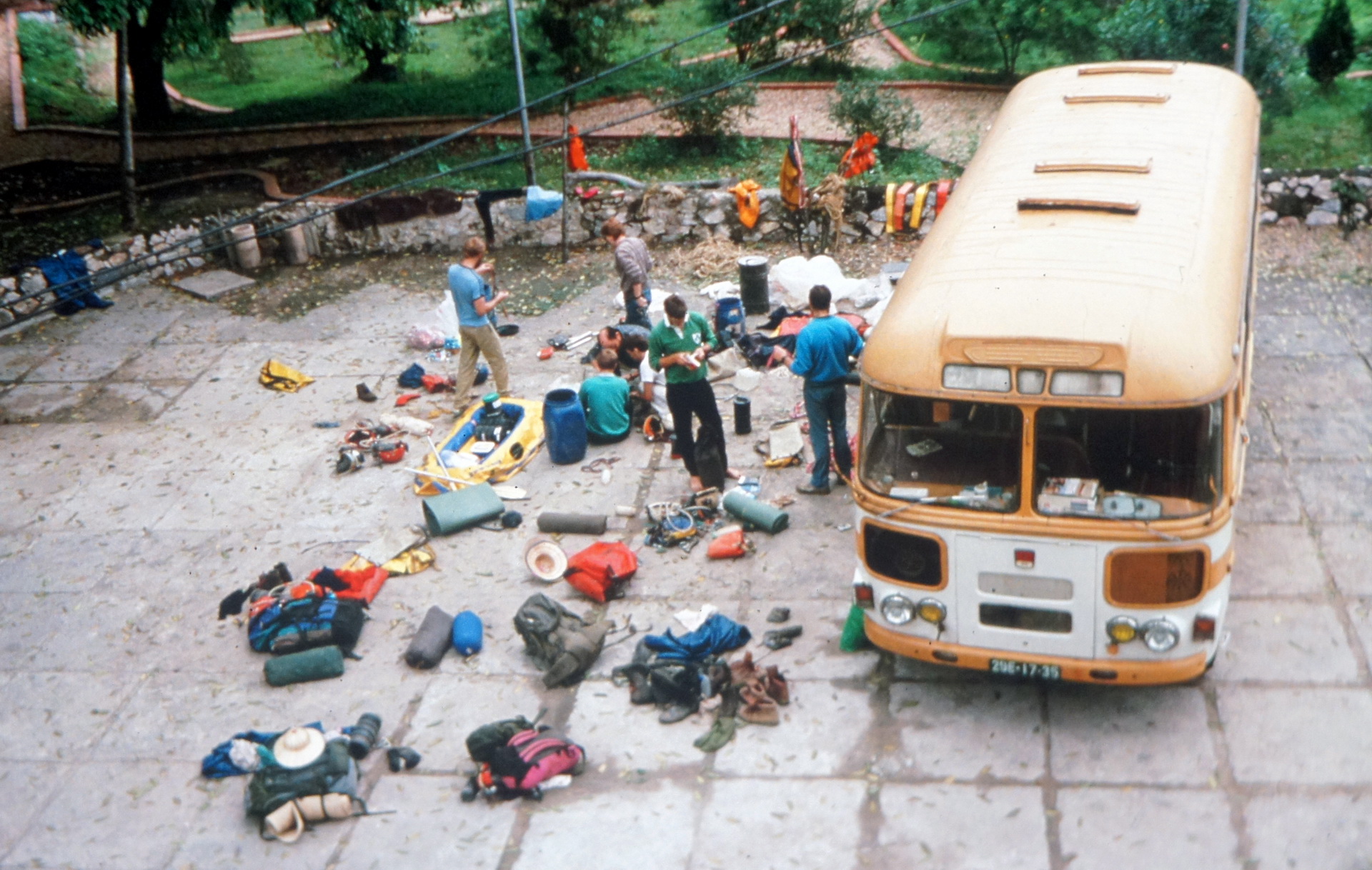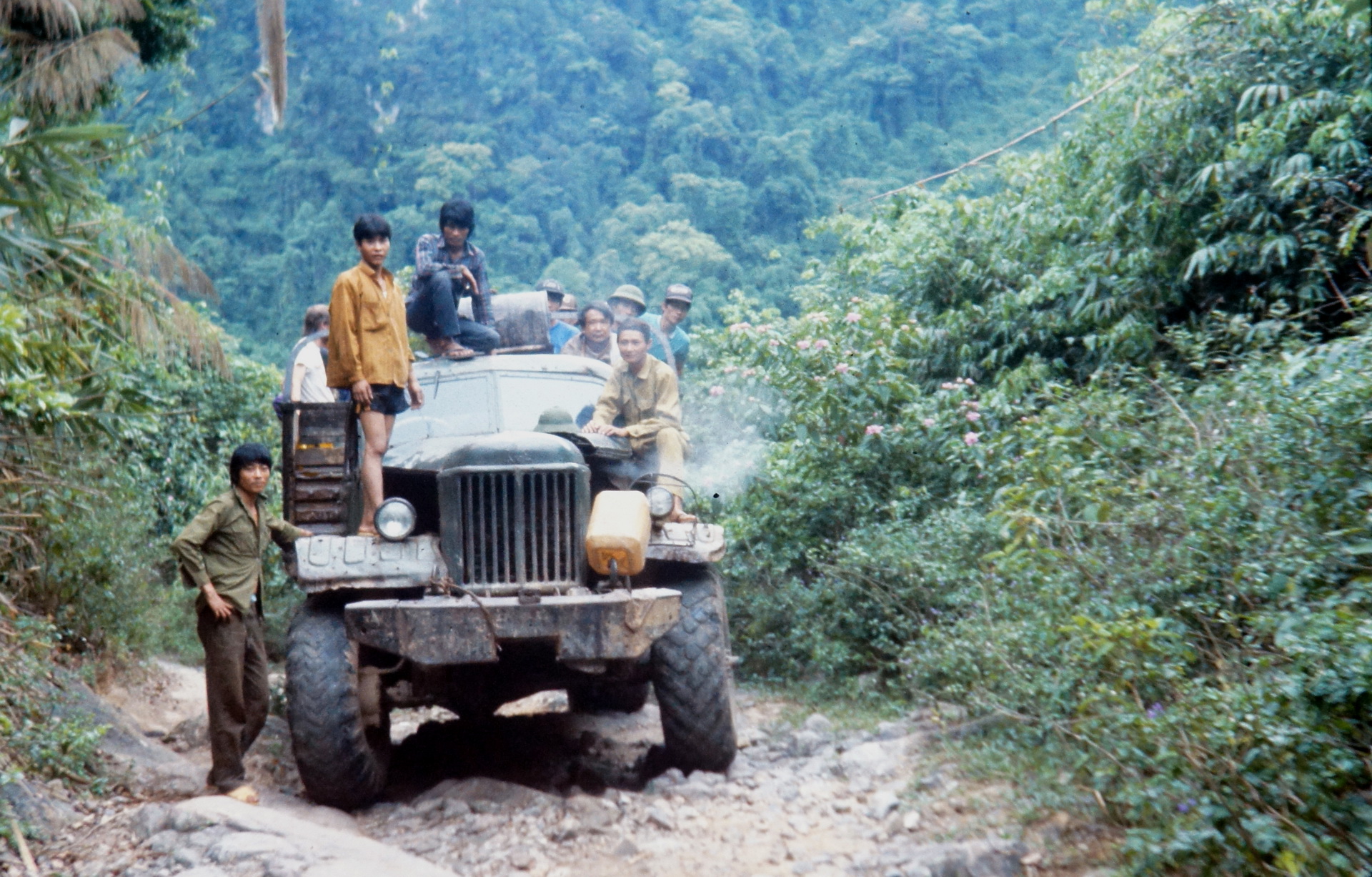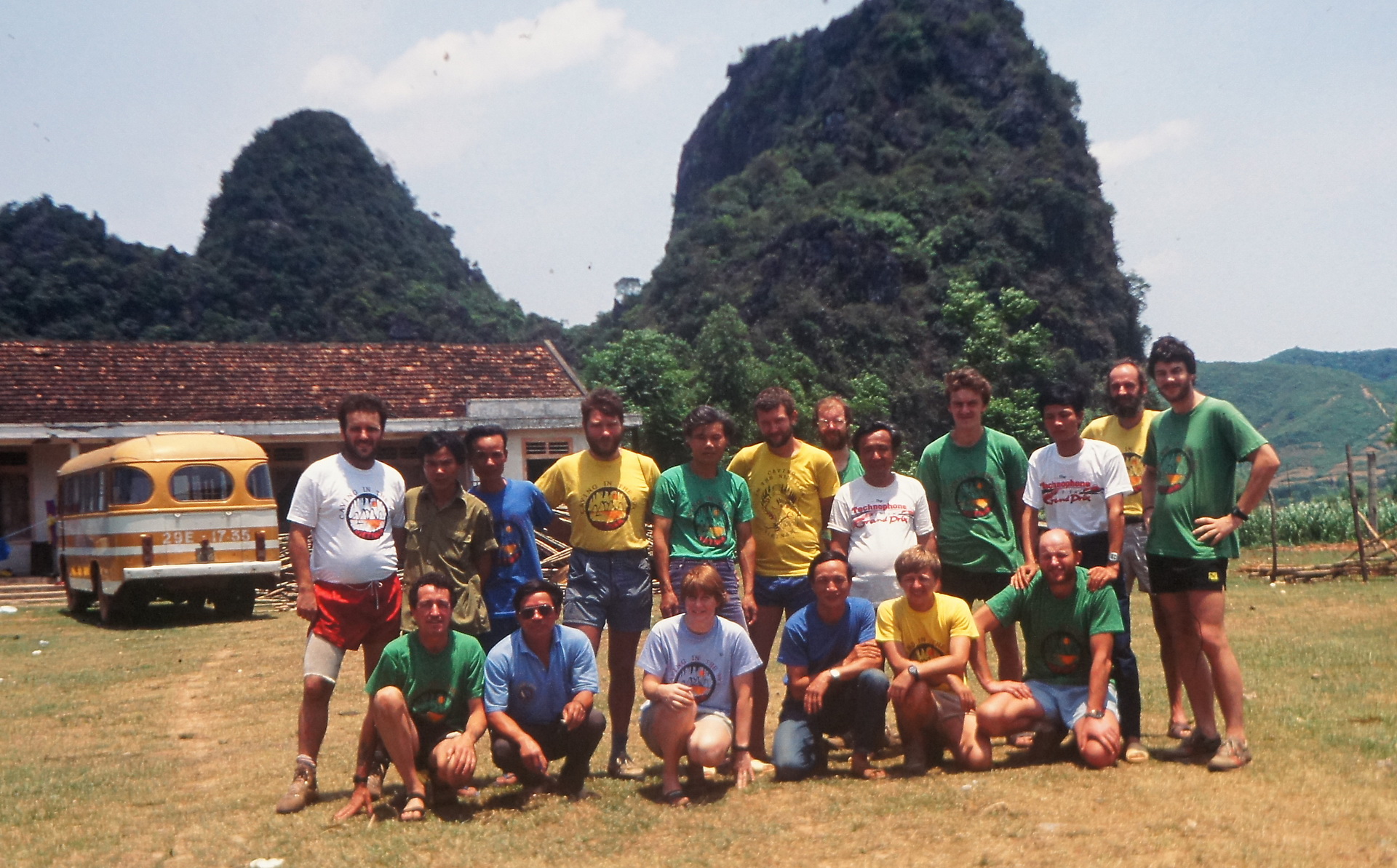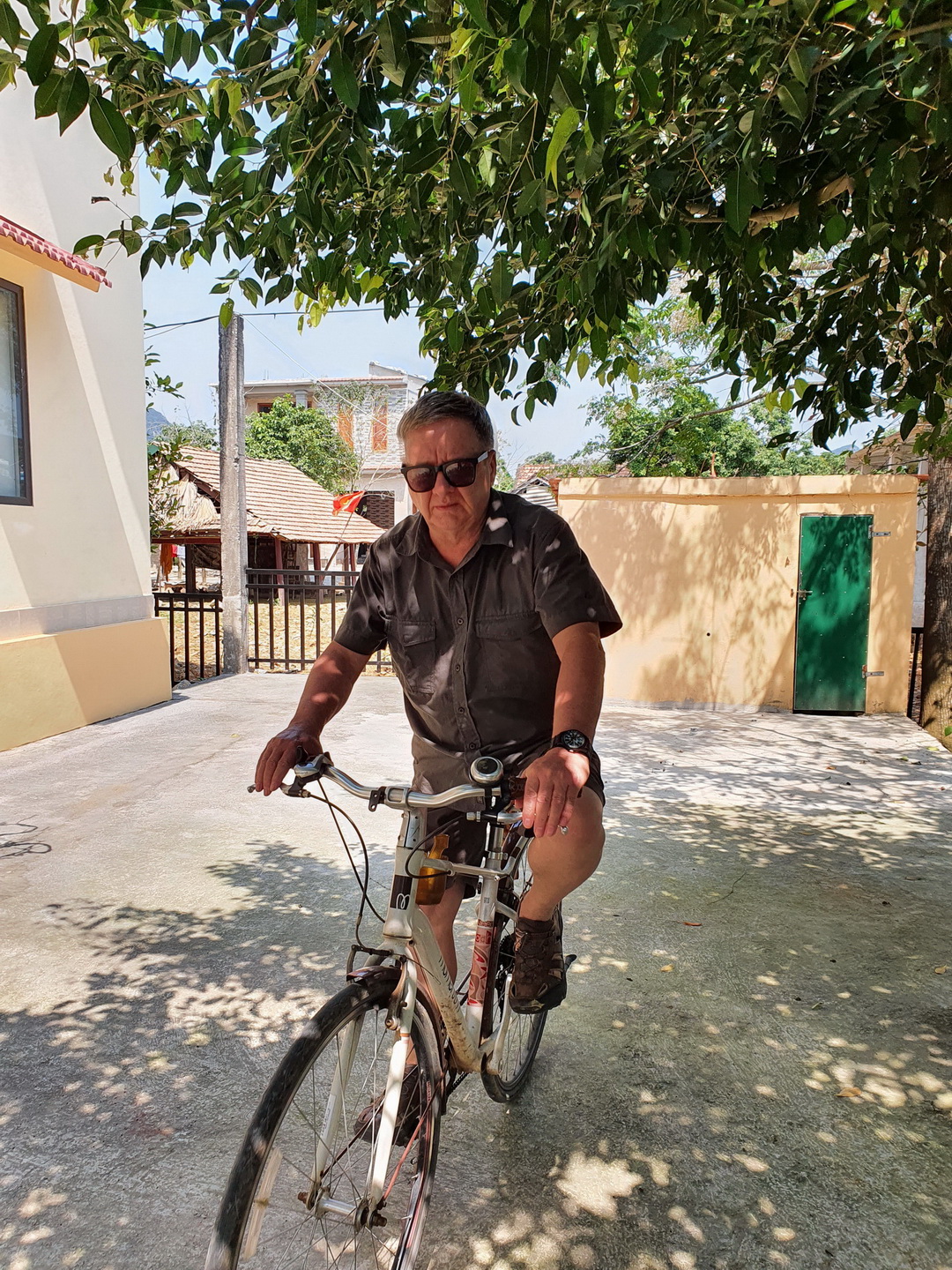“He-lo Ho-wat!” a young Vietnamese boy greeted explorer and cave expert Howard Limbert from outside a small grocery store in rural Vietnam as we pedaled by on a rainy morning in March.
The boy was not the only person to take a shot at offering Howard Limbert a choppy greeting in broken English.
In fact, nearly everyone we rode past in the town of Phong Nha, Bo Trach District, Quang Binh Province attempted to say "hello."
It is not surprising considering Limbert has spent a major chunk of time here over the past 30 years.
The 62-year-old British national happily returned each greeting he received, shouting "hello" to a woman walking down the street and returning a wave to a local bus driver.
Limbert has made a career out of exploring caves in Quang Binh, about 490 kilometers south of Hanoi, and is credited with the discovery of Son Doong – the world’s largest natural cave – as well as 300 other caverns.
|
|
| A photo taken inside Son Doong Cave in Quang Binh Province, Vietnam. Photo: Ryan Deboodt |
This year marks the 30th anniversary of Limbert’s first expedition in Quang Binh and, to celebrate, I decided to join him in Phong Nha to discuss his three decades of dedication to both Vietnam’s caves and the welfare of the people who live near them.
“It’s hard to believe it’s been 30 years,” he shared. “I’m happy to see the region grow and prosper over the years.”
Why Vietnam?
The night before our bike ride, Limbert and I had shared a dinner along the Son River, a crucial local waterway.
It was the perfect place to dig into Limbert’s nostalgia for the area, with raindrops pattering on the roof above us, water lapping up against the riverbank, and the faint chants from a nearby Catholic church drifting through the air.
“It’s like just yesterday,” Limbert said of his first visit to Phong Nha nearly 30 years ago, popping open a can of Coke Light as he began to recalled what first brought him to Vietnam.
In 1989, Limbert, having already explored cave systems around the world, was hoping to make his next expedition – one he would never forget.
To that end, he and his team of cavers mailed written requests to the governments of Laos, Myanmar, and Vietnam to ask for permission to explore and survey their respective caves.
Not too long after sending the letters, the University of Science under Vietnam National University - Hanoi contacted Limbert to offer approval and suggested he and his team visit Phong Nha, a small town in central Vietnam where locals had already discovered, but had not explored, several new cave systems.
Limbert, his wife, and a group of ten other professional cavers flew into Hanoi for their first expedition in Vietnam in 1990. From there, they traveled by road to Quang Binh.
The Limberts had no idea that the journey would be their first of countless trips back and forth between Quang Binh and the UK to explore, teach English, fundraise, and provide medical care.
|
|
| Equipment and gear of Howard Limbert’s team before their first-ever expedition in Phong Nha Town, Quang Binh Province, Vietnam are seen in this supplied photo taken in 1990. |
The very first days
“We had no clue what to expect when we decided to come here, but we ended up being the first explorers in Phong Nha,” Limbert said.
For an adventurer, the unknown are as inviting as they are frightening. Limbert found the idea of exploring a lesser-known world, where he has no idea what awaits or could possibly go wrong, to be more than exciting.
“Was the reality beyond your imagination?” I asked. Limbert’s response was simple: “Oh we loved it. It was amazing!”
Back then, navigating the country was an adventure in itself.
“It took four days alone to get from Hanoi to Dong Hoi, and another day to be here,” he recounted.
Today, Dong Hoi, the capital of Quang Binh, is just a 50-minute drive from Phong Nha.
When the Americans left and the war ended in 1975, Quang Binh was among the most war-torn localities in Vietnam.
Even 15 years later, when Limbert and his wife first set foot in the country, the province’s infrastructure had yet to be rebuilt. There were no decent roads, no electricity, and no hotels.
“The paths were extremely bumpy, and remnants of the war had been left along the way,” he explained.
Still, unexploded ordnance, Limbert was told, would be the least of his worries. His guides continuously warned him that wild animals, such as tigers, and bandits in the jungles were much more dangerous.
“Not any of them showed up, actually,” Limbert said with a laugh, referring to both the beasts and the bandits.
|
|
| Howard Limbert’s teammates are seen in this supplied photo taken in 1990. |
Limbert and his team’s first expedition in Quang Binh was an eight-day trip that led to the discovery of the ten-kilometer Phong Nha Cave – a cave so massive that the group was unable to finish exploring it before their itinerary called on them to leave for a new locality.
Two years later, in 1992, Limbert returned and was to continue exploring Phong Nha Cave.
Once it was mapped and surveyed, Limbert explained to the locals how it could be used to boost tourism in the province.
In 1995, Quang Binh opened Phong Nha to tourists, marking the first milestone in a series of restless efforts Limbert and several other cavers made to help the province.
For nearly two decades, Limbert explained, cave research in the area was slow, but in 2009 a team of cavers reached an important second milestone – the discovery of Son Doong Cave.
It took nearly five years to popularize what is now known as the world’s largest cave, but the rest is history.
Now, 1,000 visitors are granted access to Son Doong each year through a four-day-and-three-night tour package operated by Oxalis for US$3,000 per person, though caving tours are currently being suspended until at least May due to the novel coronavirus disease (COVID-19) pandemic.
|
|
| Howard Limbert and his teammates pose for a photo in Phong Nha Town, Quang Binh Province, Vietnam in this supplied photo taken in 1992. |
Most memorable: the locals
“What’s your most coveted memory after 30 years here,” I asked.
Limbert’s reply was almost immediate.
“The locals,” he said.
Those locals, Limbert explained, were really his "friends” – people who had helped him survey caves over the last three decades as well as his neighbors in Bo Trach District.
To many in Phong Nha, Limbert is called "bác Howard," which means "Uncle Howard."
“We have the locals to thank. We could not do anything without them,” he said. “They are so protective of us. They don’t even let us enter a path before they can make sure it's safe, clean, and clear.”
Limbert explained that when he and his team first arrived, none of the local guides and porters spoke English.
“We drew everything down to ‘talk’ to each other in lieu of verbal communication,” he recollected.
Limbert was also impressed that the local people, who know the jungles like the back of their hand, never used maps.
“The jungle was in their memory and without them we would have never found the cave," he said.
As the Limberts have now settled down in the neighborhood, the bond they have made with the local people has only gotten tighter.
“We forgot to refill our rice tank the other day and my wife asked a neighbor to ‘borrow’ a bowl,” he shared.
“Then the neighbor just called out loud to other people in the neighborhood that Howard is running out of rice, 'let’s all help him.'
“People must think we’re so poor we cannot even afford rice!”
|
|
| British cave expert Howard Limbert poses for a photo with his bicycle in Phong Nha Town, Quang Binh Province, Vietnam in this supplied photo taken on March 9, 2020. |
Future plans
Since their first visit, the Limberts have done what they can to help the locals, who suffer not just from a lack of money, but also a dearth of clean water and medical care.
“I wanted to come back not just for the caves, but to improve lives,” Limbert said.
Limbert explained that one of his goals for his ‘next phase’ – his next decade in Quang Binh – is to continue exploring caves, helping the local people train for jobs in the hospitality sector, and developing sustainable tourism.
“I want to help the locals and teach them English. I’m happy with what we have been doing here,” he said.
Limbert, who retired from his full-time job in 2011, said he does not know when he will retire from caving.
“I like going to the cave. I still enjoy it,” he said. “It’s happy to take groups into the cave.”
We had planned to meet again on the last day of my visit to Phong Nha, but Howard had to call it off due to a busy schedule.
“I wish I were in a cave now,” he told me as he both said goodbye and answered his phone – his fifth call that morning.
A member of the British Cave Research Association, Howard Limbert is one of the top cave experts in the world.
Limbert was head of the expedition that found and explored Son Doong Cave in 2009.
He and his wife, Deb Limbert, are now the technical directors of Oxalis Adventure.
Like us on Facebook or follow us on Twitter to get the latest news about Vietnam!



